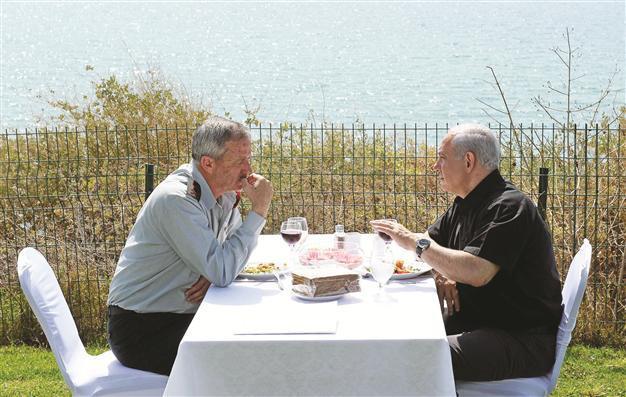Israeli leaders divided on Iran nuclear threat
JERUSALEM

Israeli PM Netanyahu (R) speaks with Chief of Staff Lt. Gen. Gantz during a meeting on the sidelines of a visit to Israeli soldiers on the occasion of Passover on April 7. AFP photo
Israel’s military chief said in an interview published yesterday that he did not believe
Iran would decide to produce a nuclear bomb, putting him at odds with Prime Minister Benjamin Netanyahu.
Lieutenant-General Benny Gantz told Israeli daily Haaretz that he believed diplomatic pressure and economic sanctions, along with Israel’s determination to strike if necessary, would be enough to deter Iran from pursuing nuclear weapons. “I don’t think Iranian Supreme Leader Ayatollah Ali Khamenei will want to go the extra mile. I think the Iranian leadership is composed of very rational people,” he said. At the same time, he warned that Israel was moving forward with its preparations to take military action if necessary. “We are preparing for it in a credible manner. That’s my job, as a military man.”
Gantz said this year would be critical in determining whether Iran decides to take the final steps needed for a weapon. “We’re in a period when something must happen: either Iran takes its nuclear weapon to an exclusively civilian footing, or the world - perhaps we too -will have to do something. We’re closer to the end of the discussions than the middle,” he said.
Netanyahu exceeds UN demandsReports of an apparent rift were confirmed by a senior Israeli official, who spoke to Agence France-Presse on condition of anonymity. “General Gantz is only repeating publicly what military leaders, including his predecessor General Gabi Ashkenazi, have continuously told the politicians in the last few years,” he said.
Gantz’s comments contrasted with the much tougher statements made by Prime Minister Benjamin Netanyahu, who said in an interview with CNN on April 24 that Iran should remain under biting sanctions until it halts all uranium enrichment, appearing to exceed U.N. demands on Tehran.
“They have to stop all enrichment,” Netanyahu told CNN in an interview in Jerusalem, adding that he would not accept Iran enriching uranium to even three percent, which is near the level required for peaceful atomic energy. “After Iran stops all enrichment ... it can get these [fuel] rods from another country that can allow it to use nuclear energy for peaceful purposes,” he said.
The sanctions “are certainly taking a bite out of the Iranian economy, but so far they haven’t rolled back the Iranian program or even stopped it one iota,” Netanyahu said. Nuclear centrifuges are “spinning as we speak. So if the sanctions are going to work, they better work soon,” he added.
Compiled from AP and AFP stories by the Daily News staff.
